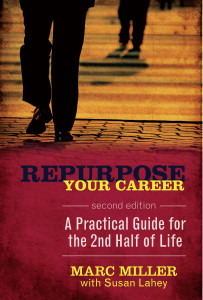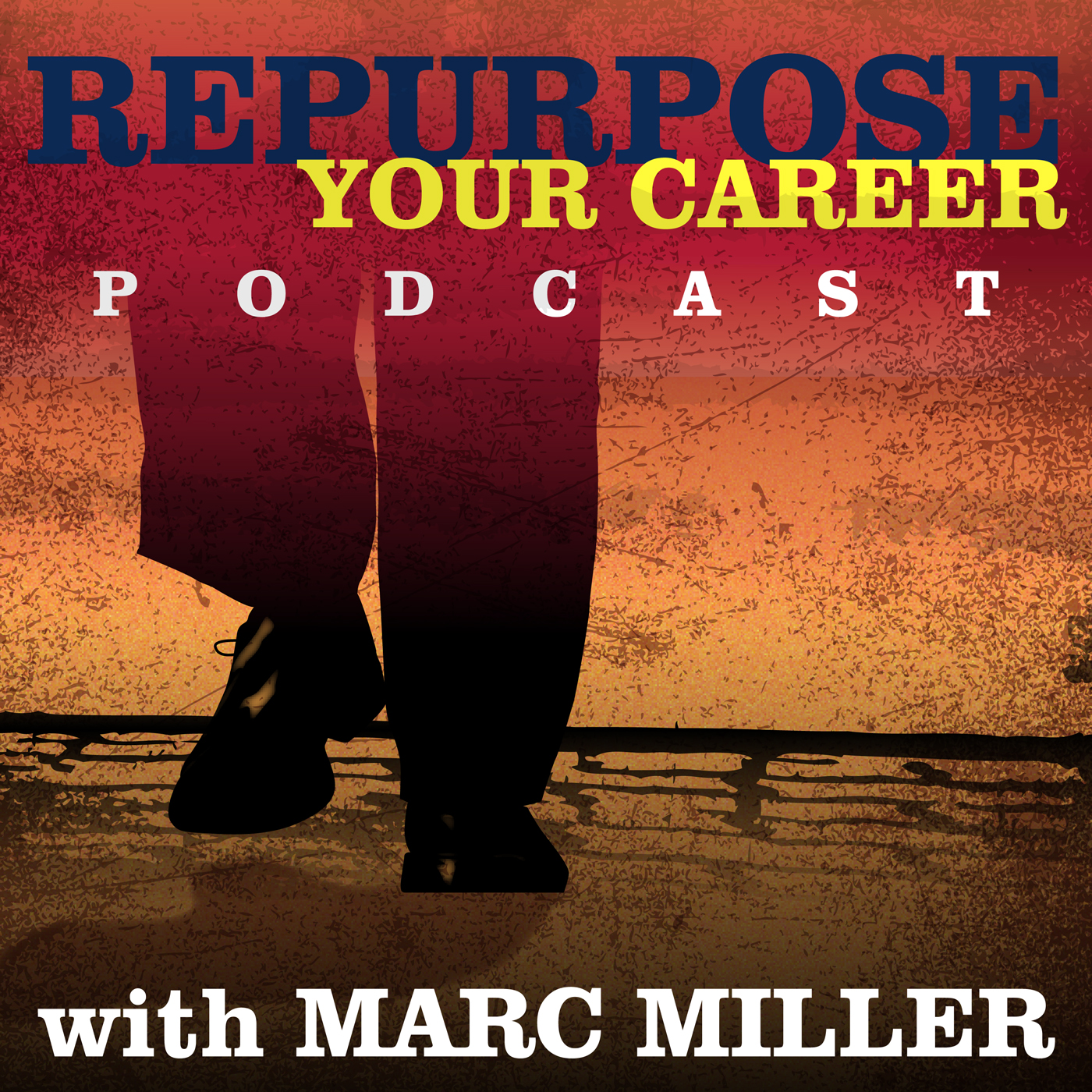Episode 12 – Marc advises Baby Boomers and Gen Xers on changes in the world and the workplace, and how to prepare to make a career pivot for the second half of life.
 Description:
Description:
In this episode, Marc shares the chapter, “Next Up: The Second Half of Life,” the opening chapter from his upcoming book, Repurpose Your Career: A Practical Guide to the Second Half of Life, scheduled to be available for pre-order in March, 2017.
Key Takeaways:
[1:42] After he wrote the first edition of Repurpose Your Career: A Practical Guide for Baby Boomers, Marc was contacted by Baby Boomers who had lost their retirements in the crash. They either couldn’t, or wouldn’t, go back to their old jobs. Marc expected those clients. But he also got contacts from others, disillusioned in their 30s and 40s.


Marc Miller
012: Next Up: The Second Half of Life
Download Link | iTunes | Stitcher Radio | Google Podcast | Podbean | TuneIn | Overcast
[3:11] Since Marc’s first book came out, the economic and technological climates have changed. With more change on the horizon, it’s difficult to confidently make choices for the second half of life. Gartner predicts that by 2025, a third of jobs will be taken over by robots, smart machines, or software.
[4:11] BYU research shows more people live alone than ever. Loneliness and isolation are a health risk as significant as smoking and obesity. Social media can lead to isolation and depression. Studies show that people who passively use social sites feel more alone, and missing out, than those who actively engage, or don’t engage at all.
[5:12] The Conference Board reports 48% of people are satisfied with their jobs, vs. 61% in 1987. Gallup reports 30% of employees are engaged with their jobs, while 50% are disengaged, and 17% are actively disengaged. Many are feeling lost and uncertain of their future, each generation being impacted according to their upbringing.
[5:59] For Generation X, born 1965 to 1980, a successful career is a good life. These are largely the latchkey children. They delayed marriage for career, and once having achieved careers, are disillusioned. They are technologically behind the Millennials.
[7:05] Gen Xers see Millennials choose careers for passion, embrace entrepreneurship and eschew material possessions in favor of experience, and they wonder, should I take that route? One client is a Gen Xer who saved money for decades. She took a short sabbatical in Southeast Asia. She saw poor but happy people. She had not been happy.
[7:48] A career pivot, whether alone, or in a family, is challenging. The 50s used to be the peak earning years — not necessarily, anymore. With children, changing careers at this point may threaten financially security, which may be unwelcome. Starting a relationship at this point may be even harder. Gen Xers need to earn a living.
[8:33] Baby Boomers thought they would already be retired, but are not prepared. This age group commits suicide at twice the rate they used to, and they feel the world has changed so much, they don’t know how they fit in it. No one wants to hire them. They are seen as being slow to adapt. It takes effort to connect Boomers to Millennials.
[11:20] Look forward. Which tasks will still require the human touches of empathy and creativity? Robot journalists now write stories and commercial content. Almost anything you want done, can be done by self-service or a mobile app, and Millennials prefer it that way, even calling for a self-driving car instead of owning a car.
[12:46] Social and professional networks are the most important piece of any career change — people you know, in the field or company where you want to work, or who know them. LinkedIn and Facebook’s Professional pages capitalize on human networks. Mark Granovetter said recommendations by people you know slightly, still carry weight.
[14:15] You may have people you knew 20 years ago, who think well of you, and are in completely knew industries, that could be vital to your networks. To make a change, it takes, connections, supporters — a tribe, to help you transition. New tech grants access to information about who might be members of that tribe who could help you.
[14:53] You are the most important person to know. What are your talents? What makes you love one job more than another? Which environments put you in the zone? Can you commute? What kind of office do you like? What kind of team is best for you? What challenges you? What bores you? What salary do you need? It takes time to work it out.
[17:44] Action steps: Are you successful in your career, and still not happy? Reflect on how you got there. Assess whether your job can be replaced by a robot. Have you had weak ties assist you in your career? Reflect back on when and where. We will use this later.Weak ties are probably one of the most important concepts for your career pivot.
Mentioned in This Episode:
Contact Marc, and ask questions at: Careerpivot.com/contact-me
Repurpose Your Career: A Practical Guide to the Second Half of Life, by Marc Miller with Susan Lahey, available in early 2017
Repurpose Your Career: A Practical Guide for Baby Boomers, by Marc Miller with Susan Lahey
“The Strength of Weak Ties,” Paper by Mark S. Granovetter
Take a moment — go to iTunes, Stitcher, or Google Play. Give this podcast a review and subscribe! If you’re not sure how to leave a review, please go to CareerPivot.com/review, and read the detailed instructions there.
How to Find More About the Podcast and Subscribe
Make sure to check out the Career Pivot Community.
You can contact us here.
Marc invites you to connect with him on LinkedIn.com/in/mrmiller. Just include in the connection request that you listen to this podcast.
You can look for Career Pivot on Facebook, LinkedIn, or @CareerPivot on Twitter.
You can get updates on this podcast by clicking on the Get Career Pivot Insights button below.
You can also subscribe to the podcast on iTunes, Stitcher, Google Podcasts, Podbean, Overcast, Spotify, and Pandora.
The podcast is available on YouTube.
Please consider writing a review on Apple Podcast or on Podchaser.com.
Like What Your Read? Get Career Pivot Insights
Do You Need Help With ...
Check out our Help Center where you have access to 14 different content portals.

